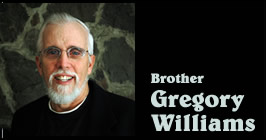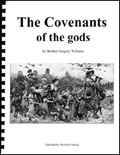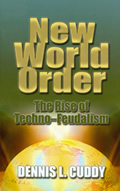by Brother
Gregory Williams
December 19, 2010
NewsWithViews.com
In the Old Testament God promises to heal the land of Israel if they will turn from their wicked ways.[1]
What were those wicked[2] ways? Were they the wicked ways of those who followed after Nimrod?[3] Were they the wicked ways when the voice of the people[4] went against the advice of Samuel and rejected God[5] by electing Saul? Were they the wicked ways of Herod and the Pharisees in Judea when they were told to repent by Jesus Christ? Do men continuously turn to ways that are contrary to the way of God and salvation? Have we strayed from that narrow way today?
“But this thou hast, that thou hatest the deeds of the Nicolaitans, which I also hate.” Revelation 2:6
What were the deeds of the “Nicolaitans”? Are they the wicked ways we are to turn from?
John the Baptist called the people to repentance which meant turn around and go another way. Was that because they were going a different way, a wicked way? The secret of the Nicolaitans is key to healing the land and returning to liberty under God in the world today, but the truth has not been without disputation.
Beda Venerabilis, a monk at the Northumbrian monastery in the 7th century said Nicolas allowed multiple spouses. This idea probably led to Thomas Aquinas of the 13th century suggesting the error concerned polygamy or having common wives. Eusebius (c.263 - 339) suggests that the sect of the Nicolaitans was short-lived which would have to be true if there ever was a particular group or sect going by that name. Some say the sect was named after “Nicolas the deacon”[6] or named after the bishop “Nicolas of Samaria” who was in the company of Simon Magus. It is true that Irenaeus, Epiphanius, and Theodoret mention the Nicolaitans but there is no clear evidence that it was a particular group headed by an heretic named Nicolas.
But earlier comments of Hippolytus of Rome (c 170 – c 236) and later Victorinus of Poetovio (writing in 270AD) suggest that the heresy involved the idea of “fornicators and eaters of things offered unto idols.” This is probably near the truth and may be one in the same thing.
Since it was the “deeds” and the “doctrines” of the Nicolaitans that we should be concerned with, we do not need to know who they were but what they were doing.
“Having eyes full of adultery, and that cannot cease from sin; beguiling unstable souls: an heart they have exercised with covetous practices; cursed children: Which have forsaken the right way, and are gone astray, following the way of Balaam [the son] of Bosor, who loved the wages of unrighteousness;” 2 Peter 2:14-15
What are the covetous practices and wages of unrighteousness of Balaam? Peter states that through covetousness and feigned words the people will become merchandise.[7] He also warns that men will promise you liberty but that you will be again entangled worse than before because you would turn from the righteous ways again.[8]
What was the connection between the doctrine and deeds of the Nicolaitans and Balaam? If anyone desires to "divorce Baal" they need to understand who or what he is. Balaam is from the Hebrew word Bal or Baal (leb and lb), meaning “lord” or “master”[9] and am references Hebrew word for “people.”[10] It is an expression of superior rank over the people, which is contrary to the directive of Christ, the King, who came to set men free, and God's desire to rule us in our hearts and minds.
Baal is thought to be the ruler of the demons[11] and is considered to be another name for Beelzebub. Baal-hamon was the Ruler of Multitudes who sought dominion over all the things of the earth by becoming the ruler over men. Another name was Baal-berith who bound men with covenants, i.e., contracts. To be the ruler of contracts is to be the supreme judge of all contracts.
This is a governmental position and those who had the authority to be the “Ruling Judge” of contracts, agreements and disagreements were called “gods.”“'Ba-al' can refer to any god and even to human officials”[12] The gods of the Old Testament and the “gods many” of the New Testament spoken of by Paul were just that, human officials, magistrates and judges.[13]
These men, which by nature are no gods, obtained power over the people because the people made contracts[14] with them, often to obtain some sort of benefit.[15] From Cain to Lemech, from Nimrod to Pharaoh, from Caesar and the Pharisees, even to this modern time, men have sought to rule over their brothers by force. For that force to be legal there must be consent in the form of a contract whether implied, constructed or executed. These agreements[16] that were often with what the Bible calls unbelievers were like a marriage or covenant with these other gods many of men. Those who entered into those agreements, often through application for benefits[17] were considered fornicators or adulterers.
Balaam told the Moabites and Midianites, who surrounded Israel, that they could bring Israel down by getting them to sacrifice to idols[18] and to commit fornication.
The phrase “things offered unto idols” is derived from the Greek word eidolothuton (e-d??-??t??).[19] There does not seem to be any reference to eidolothuton being used anywhere else in Greek literature.[20] It appears the word was coined by Paul as a polemical term derived from the Greek words for sacrifice and gods. It appears to be “the negative counterpart to Corban.”[21] In Mark, according to Jesus, the Corban of the Pharisees[22] made the word of God to none effect. But originally Corban was the contribution or sacrifice of the people in society to take care of the needy in their community.
It becomes evident that Nicolaitan and Balaam are two different word forms of the same idea when we come to the knowledge that Nike is the Greek word for “conqueror” with nikos meaning “victor” or “conquer”, and laos is a word that also means “people.” Both, Nicolaitan and Balaam, include the idea of rank, lordship, and submission to an exercising authority by the people.
These words express the simple idea that authorities like Nimrod[23] of Babylon may obtain power over the people because the people apply to these men who call themselves benefactors but who also exercise authority one over the other. This power is not granted by God, but men are allowed by God to reject Him and give power over themselves to men, relinquishing rights by the consent and through the voice of the people.
This power to exercise authority often includes the “power” to judge or rule over men, but goes beyond the natural right to judge crimes of brutality and robbery. We are talking about systems where men force other men to bow and serve with their labor. Systems where men act as gods,[24] judging and making laws that men must pay homage, homage, giving fealty or allegiance.
Nicolaitans were not followers of a man but of a doctrine. They were the people “who were charged with holding the error of Balaam, casting a stumbling block before the church of God by upholding the liberty of eating things sacrificed to idols as well as committing fornication.” They were snared by their own appetite for benefits provided not at the expense of their leaders but at the expense of their neighbor. The people were devoured in the civic pot of their own flesh.[25]
The things sacrificed to idols were the welfare programs provided by and administered through the civic altars of those various governments. One could become eligible for those benefits by an application for membership. This application often included an agreement to serve and contribute regularly to those incorporated altars of the state. There usually was an oath required, under the penalty of the courts who administered those systems.
Both God’s Kingdom and the kingdoms of the world had their temples and their ministers (clerks, bureaucrats, clergy, or administrators) who managed the institutions or altars of contributions. Judea had its Corban and Rome had its Qorban. Both began as free will offerings and degenerated into compelled obligations of contract.
Distinguishing the Nicolaitan or Balaam system of lords and laity, master and subject, from the liturgical ministers and laity established by Moses, John the Baptist, Christ and His Church is fundamental once the mechanism is revealed. Some systems of faith and allegiance have a top-down administration that exercise authority one over the other, but the ministers of God turn the world right side up through a system that operates according to the perfect law of liberty by faith, hope and charity.
The error or stumbling block is to imagine that there is a God-given right to take from our neighbor through legal systems of social welfare. God hates these systems[26] which operate by force under the guise of charity, especially when they encourage the people to covet their neighbor's goods in a system that compels contributions under the pretense of social welfare. This socialistic sin of the Nico-Laity or the error of Bal-am stems back to the original error of mankind.
“Woe unto them! for they have gone in the way of Cain, and ran greedily after the error of Balaam for reward, and perished in the gainsaying of Core.” Jude 1:11
This verse is explained with the following verse:
“These are spots in your feasts of charity, when they feast with you, feeding themselves without fear: clouds [they are] without water, carried about of winds; trees whose fruit withereth, without fruit, twice dead, plucked up by the roots;” Jude 1:12
If we are to distinguish between the ways of Balaam and the Nicolaitan and the ways of Christ, and turn from our wicked ways and heal this land, “We must learn to distinguish between charity and socialism. Charity is good, socialism is evil. (Pr. 14:30, 31, 19:17) Charity is for the helpless poor while welfare makes the poor helpless. (Ga. 2:10)”[27]
“Liberty is not collective, it is personal. All liberty is individual liberty.”[28] You cannot secure liberty or happiness without virtue in the people and it is not virtue to covet your neighbor's goods.
Through social compact people entangle themselves as little more than human resources of the state.[29] Praying for the benefits of their civil feast their covetous practices produce the wages of unrighteousness and all are captured in the net of their own making, which is a foolish rejection of God.[30] “It is impossible to introduce into society a greater change and a greater evil than this: the conversion of the law into an instrument of plunder.”[31] “All socialism involves slavery”[32] " Redistribution is immoral... it allows one person to treat another as no more than a means...”[33] a human resource.
| Subscribe to the NewsWithViews Daily News Alerts! |
It is not loving your neighbor and God hates that. Like Cain, the people bludgeon their neighbor to satisfy their own lusts, wants and desires. The welfare state is the enemy of religion.[34] When pure religion[35] diminishes, socialism flourishes. “Socialism is the religion people get when they lose their religion.”[36]
Footnotes:
1.
“If my people, which are called by my name, shall humble themselves,
and pray, and seek my face, and turn from their wicked ways; then will
I hear from heaven, and will forgive their sin, and will heal their
land.” 2 Chronicles 7:14
2.
07451 er ra` her ra`ah from 07489; AV-evil 442, wickedness 59, wicked
25, mischief 21, hurt 20, bad 13, trouble 10, sore 9, affliction 6,
ill 5, adversity 4, favoured 3, harm 3, naught 3, noisome 2, grievous
2, sad 2, misc 34; 663 adj. 1) bad, evil. n m 2) evil, distress, misery,
injury, calamity 2a) evil, distress, adversity. n f 3) evil, misery,
distress, injury.
3.
Nimrod
the Hunter. Nimrod
to Now, Video Series
4.
“Voice
of the People”
5.
1 Samuel 8:7
6.
Hippolytus of Rome c. 170 – c. 236, The Refutation of All Heresies
or Philosophumena., VII, chapt. xxiv.
2 Peter 2:3
7.
2 Peter 2:3
8.
2 Peter 2:19-20, Galatians 5:1
9.
leb These three letters Beit, Ayin and Lamed can be translated man,
man given, husband or captain but always in the sense of owner, lord,
master, even dominion. If you add letters it becomes Lord of the covenants
or fortune or if you add a Heh it becomes mistress, female owner as
a sorceress.
10.
05971 Me `am, people 1836, nation 17... 1) nation, people
11.
Matthew 12:24, Mark 3:22, Luke 11:15
12.
http://en.wikipedia.org/wiki/Ba'al
13.
There
are gods many.
14.
Exodus 23:32 “... make no covenant with them, nor with their gods.”
15.
The
Covenants of the gods.
16.
2 Corinthians 6:16
17.
Job 18:5...10, Psalms 69:22, Proverbs 1:10...19; 23:1...6, Romans 11:9
18.
Acts 15:29, 21:25, 1 Corinthians 8:1...10;10:19...28, Revelation 2:14...20
19.
1494 eidwloyuton
eidolothuton AV-things offered unto idols 4, things offered in sacrifice
to idols 3, things sacrificed unto idols 2, meats offered to idols 1;
10 1) sacrificed to idols... 1a) it was either eaten at the feasts or
sold in the market
20.
There
is some question about its use in 4 Maccabees 5:2 and its appearance
in Sibylline Oracles 2:96 seems to be the result of its use in Acts.
21.
Tyndale Bulletin
44.2 (1993) 237- 254. Not so Idle thoughts about Eidolouthuton. By Ben
Witherington III
22.
The
Corban of the Pharisees
23.
Nimrod
the Hunter.
24.
There
are gods many.
25,
“...This city shall not be your caldron, neither shall ye be the
flesh in the midst thereof; but I will judge you in the border of Israel...”
Eze. 11:3, 11. Exodus 16:3; Proverbs 1:10, 33; Micah 3:1, 4; Zechariah
14:21
26,
The
Nicolaitan who God hates covet their neighbor's goods
27,
Evangelical Bible College of Western Australia Commentary. Revelation
by Dr Peter Mose [Book 97-2] July 2004
28,
John Calvin Coolidge, Jr., 1872 – 1933, 30th President of the
United States.
29,
2 Peter 2:3 “And through covetousness shall they with feigned
words make merchandise of you: whose judgment now of a long time lingereth
not, and their damnation slumbereth not.”
30,
Ex. 20:17, 1 Sa. 8; 13:13, Ro. 7:7, 13:9, Col. 3:5, Heb. 13:5, 2 Pe.
2:3-14
31,
Frederic Bastiat, 1801 – 1850, French theorist, political economist.
32,
Herbert Spencer, 1820 – 1903, an English philosopher.
33,
The Kantian ethic of capitalism. Harold B. Jones, Jr.
34,
State Welfare Spending and Religiosity, A Cross National Analysis by
Anthony Gill and Erik Lundsgaarde.
35,
Pure
Religion
36,
Richard John Neuhaus, 1936 – 2009, prominent American clergyman.
� 2010 Brother Gregory Williams - All Rights Reserved
Sign
Up For Free E-Mail Alerts
E-Mails are used strictly for NWVs alerts, not
for sale
Brother Gregory was born in America in 1948. His father was a practicing attorney and his mother the daughter of Norwegian immigrants. He Married in 1973, and is the Father of 6 children with a growing number of grandchildren. He grew up in southeast Texas, attending private schools, entering the seminary at 13, where he studied Latin, Greek, and theology. In the course of these studies he began to become aware of secrets hidden for centuries within ancient libraries that began to reveal a more fundamental purpose in the gospel of Christ. His quest to understand the “whole truth” has led him down a labyrinth of law and language, history and prophecy, fable and fallacy, in a unique portrait of bondage and betrayal, liberty and freedom, and the solution and salvation.
He is the author of several books, include The Covenants of the gods, Thy Kingdom Comes, and The Free Church Report, dozens of pamphlets, audio, and video recordings. He has appeared on radio and television “preaching the gospel of the kingdom of God” which is at hand, within your reach. His common theme is how are men brought into bondage and how are they made free souls under God. His hope and prayer is to bring man's relationship with the God of creation and his relationship with the gods of the “world” into a new perspective and light. Knowing the truth shall set you free, if we will do the will of our Father in heaven.
He now lives near Summer Lake, Oregon where he continues to care for his family, tending sheep of the Church and overseeing the edification of the Church established by Christ in the hearts and minds of congregations of the people, for the people, by the people who will seek the Kingdom of God and His righteousness.
Website: HisHolyChurch.org
E-Mail: gregory@hisholychurch.org















